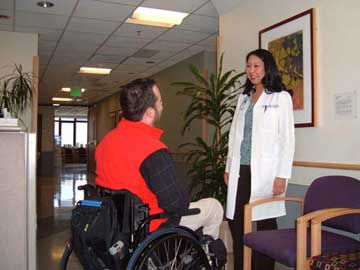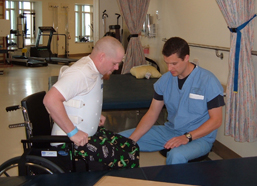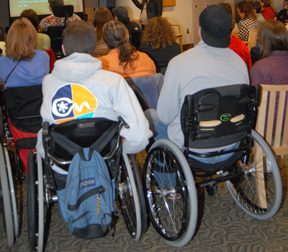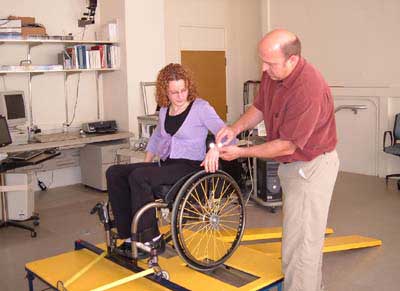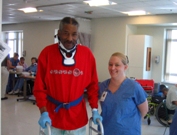SCI Forum Reports
Sexuality and Relationships
November 3, 1998
"Men with spinal cord injuries aren't the only ones who have problems with erections," said Ivan Rothman, a nurse practitioner in the Department of Urology with a specialized practice in erectile dysfunction. "About 10-20% of the general male population have a problem with erectile dysfunction, defined as the inability to attain or maintain an erection in order to perform sexual intercourse," he said. The problem is more common in older men, but largely because the health problems that can cause erectile dysfunction are more common in later life.
Libido, erection, ejaculation, and orgasm are four separate aspects of male sexual function, Rothman said. Libido is sexual desire or interest in sex. Erection is the increase in size (tumescence) and hardness (rigidity) of the penis. Ejaculation is the expulsion of semen from the penis. Although ejaculation doesn't serve a function in male sexuality aside from reproduction, said Rothman, "some men are truly troubled by not being able to ejaculate. It affects their sexual identity." Contrary to common belief, orgasm - the pleasurable sensation associated with the completion of the sex act - is different from ejaculation. "This becomes more obvious when you've had some kind of insult to the body," said Rothman. "Men who've had a radical prostatectomy for prostate cancer, for example, can frequently have orgasm but most often don't ejaculate any more."
The ability to get an erection requires three steps, Rothman explained. The first step, "ignition," occurs when a nerve signal from the brain tells the smooth muscles surrounding the erectile tissue in the penis to relax. Once the arteries in the penis relax and widen, blood flow to the penis increases. As the penis fills, veins that carry blood out of the penis become compressed, trapping the blood so it flows into the erectile tissue faster than it leaves. This causes the penis to enlarge. "In the U.S., the most common cause of erectile dysfunction is failure of trapping," Rothman said.
"People with upper motor neuron injuries will maintain reflexive erections and can get good results from treatments for filling and trapping problems," Rothman said. Reflexive erections are involuntary and occur in normal men throughout sleep. It's harder to treat men with lower motor neuron injuries because they have lost the ability to have reflexive erections, Rothman said, "but as with everything in spinal cord injuries, it's very individual and hard to predict."
Problems with the ignition stage can be treated by injecting a medication directly into the penis. This opens up the small arteries and veins, allowing blood to flow in and fill the penis. In Rothman's experience, this treatment works 50-60% of the time. It is usually covered by insurance. The same medication can also be delivered into the penis by placing an intraurethral suppository through the urethral opening, but Rothman has found it to be less effective and more expensive than the injection.
Treatment of erectile dysfunction caused by trapping and filling problems has changed radically with the arrival of the oral medication sildenafil citrate (Viagra), Rothman said. "I start pretty much everybody on it unless there's a reason not to," as would be the case with patients who are taking medications containing nitrates, such as nitroglycerin. Viagra works by increasing blood flow to the penis, causing an erection. Success with Viagra is pretty much the same in men with SCI as in the general population, Rothman said. "I generally tell men that if they get any kind of erection on their own, Viagra is probably worth a try." The more often a man's erection occurs with sexual stimulation, the more likely Viagra will be successful. (For more information about Viagra, talk to your doctor, or contact the Pfizer pharmaceutical company at 1-888-4VIAGRA or, on the Internet, at http://www.viagra.com/.)
Trapping problems can also be treated with a vacuum erection device that provides suction to the penis. Once the penis gets larger, a constricting ring is placed on the base of the penis, trapping the blood so the penis stays hard. Rothman said this method works best with men who are able to get erections but can't maintain them.
When medical treatments for erectile dysfunction have been unsuccessful, a semi-rigid or inflatable device can be surgically implanted in the penis. There are many types of penile implants, Rothman said, but in general they are not a good choice for men who have poor penile sensation, a Foley catheter, or chronic infections.
Rothman noted that men in his practice who are married or in long-term, stable relationships have the most success with treatments for erectile dysfunction, regardless of the cause, because "their sexual communication is better and they are more open to problem-solving. Remember, if a treatment fails, it's not you that fails, it's the treatment that's failing."
Women with SCI may not have sensation or motor function, said Steve Stiens, MD, assistant professor of Rehabilitation Medicine, "but they will have reflexive vaginal lubrication with stimulation and may have reflexive contraction of the pelvic floor during intercourse."
"What's really encouraging is that both women and men with SCI do experience orgasm," Stiens said. "Sometimes you need to explore to find where sensitive areas are and produce sensual stimulation in other ways, such as using more fantasy or visualization. Some people with SCI have reported finding areas of their skin that are as exciting to touch as their genitals were before injury. Searching for these areas and refining ways of stimulating them can be a fun adventure."
"When I broke my neck at 16, my self-image was pretty severely damaged," said Nick, who has incomplete C5 tetraplegia. "I was concerned about whether I could function sexually again." Nick was one of six panelists--three men with SCI and their non-disabled wives--who discussed their own experiences with intimacy and sexuality after injury.
The panelists agreed that communicating openly, taking things slowly, and being sexually creative were essential for a satisfying sexual relationship. Nick sat down and explained everything to his wife, Susie, when they were dating - how the condom catheter worked, why he took so long in the bathroom, etc. He let Susie know he could have sex and wanted to try. "So we took it slow, and talked about it romantically," Nick said. "If something is uncomfortable, you just try a different position."
Justin, who has T7 paraplegia, remembered attending an SCI forum on sexuality soon after his injury and thinking he'd never have a sex life again. "I couldn't imagine it," he said. "Even after you start having sex again, it takes a while to relearn yourself sexually."
Whether it was the first kiss or the first sexual intimacy, Steve, who has T2 paraplegia, always let his wife, Beth, know that he was anticipating it and planning how it would work. "I learned that just talking about things can be really romantic and exciting," Steve said.
People with SCI are often concerned at first about having a bowel or bladder accident during intimate moments. "I wet the bed twice on our honeymoon," said Justin. Humor helped him and his wife, Jessie, weather these awkward moments.
After an SCI, "your sexuality is more connected to how your partner is feeling and responding," Steve said. "For me, Beth is a mirror. If she is flushed or excited, I know I'm doing the right thing."
"In the beginning, Steve said to me, 'I count on you to let me know how it's going'," Beth said. "Eventually it got easier and better. Viagra was our ten-year anniversary present. It really added a lot to our sexual lives."
Justin tried several methods to achieve erection. While the vacuum pump didn't work, the injection worked too well-his erection didn't go away for a long time. "Then Viagra came," he said. "It helped me function more like I used to before the injury."
Panelists agreed that it's important not to have too many expectations or to focus solely on orgasm or ejaculation. They recommended exploring new erogenous zones and trying lots of different methods of stimulation, from oral sex and vibrators to sexy lingerie and fantasy, acknowledging that some techniques may be awkward at first. "I come from a midwestern Catholic family," Beth said. "We didn't talk about sex, ever. But Steve and I tried a lot of things. I'm not big into vibrators, but we tried anyway."
"It's important to focus on and use the sensate body for sexual stimulation," Stiens said."If you can't use your legs and arms much, focus more on oral sex. It's a great way of satisfying your partner and using your own sensate organ - your mouth. People report a lot of satisfaction that way."
Men with SCI may experience ejaculation and orgasm as separate events. "Sometimes I get orgasm without ejaculation, or the reverse," Justin said. "I tend to have spastic legs, but after ejaculation they're like noodles." He experiences orgasm as "a body high". And my head 'goes off,'" he said.
Men with high-level injuries may be at risk for autonomic dysreflexia during ejaculation, and should talk to their doctors about how to deal with the symptoms, Steve said. The first time Nick ejaculated after his injury "I thought my head was going to explode," he said. Now his body "gets perfectly erect" when he ejaculates. "Orgasm is totally different. My body gets hot, and I get a kind of head rush."
People with SCI often have to sacrifice sexual spontaneity. "There's a lot you have to do just to get ready to have sex," Nick said. "So talk about it while you're getting ready. Get yourselves excited by talking erotically."
"If possible, it is preferable to separate personal care and intimacy in a relationship," Stiens said. "It's good for a spouse or partner to know your personal care needs-catheterizing, bowel care, bathing, etc.-but not have to do it all the time. Attendants can be helpful with these needs. Relationships with attendants should be strictly business. Permitting sexual intimacy in a relationship with an attendant is a recipe for disaster."
For more information, Stiens recommended the book Sexuality After SCI-Answers to Your Questions, by Stanley H. Ducharme and Kathleen M Gill (Paul H. Brookes Publishing, 1997).

